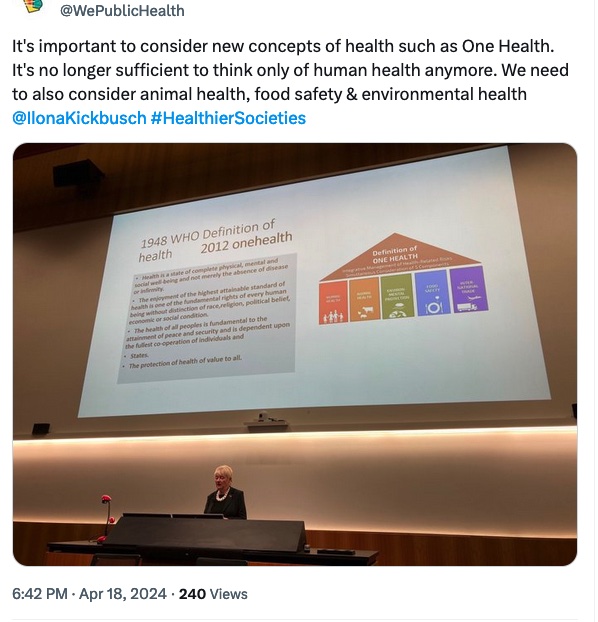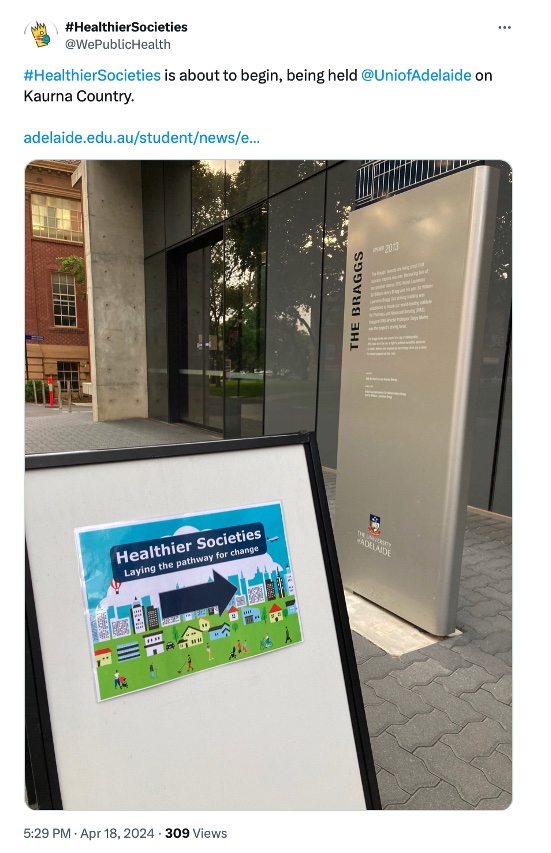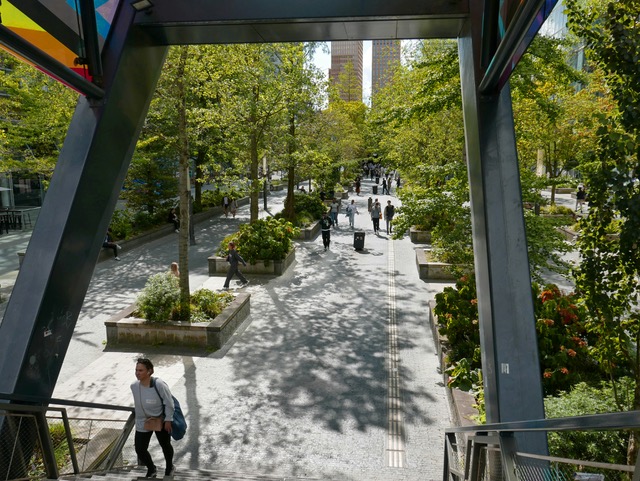Introduction by Croakey: As the world grapples with the interlinked public health crises of climate disruption, environmental breakdown, conflict and wars, rising inequalities, fragmentation of societies, undermining of social cohesion and democracies, harmful corporate power, and a dangerous, unstable news and information ecosystem, the University of Adelaide recently hosted a timely public event.
‘Healthier Societies: laying the pathway for change’ was the title of a lecture by Professor Ilona Kickbusch, an internationally renowned public health and health promotion expert, and a former South Australian Thinker in Residence.
Alison Barrett reports for the Croakey Conference News Service. (Also see this previous related article, Regulators urged to address concerns about the digital transformation harming children and young people.)
Alison Barrett writes:
New approaches to societal structures, systems and health economics are critical for creating healthier societies, according to world-leading public health expert Professor Ilona Kickbusch.
“We still carry with us these old societal structures that are counter to equity and wellbeing,” Kickbusch told an audience at the University of Adelaide on Kaurna Country last week.
She said initiatives like South Australia’s Voice to Parliament “could be a wonderful example” of addressing the impact from old societal structures on the health and wellbeing of Aboriginal and Torres Strait Islander people.
Kickbusch also said collective actions, understanding current and future challenges and rebuilding trust will help create healthier societies. Sustainability, resilience, equity, trust and empowerment should be the considerations guiding change, she said.
Societal wellbeing is hampered by political division, she said. Trust in government institutions, businesses and media is down, which is “scary for public health” in implementing policies, campaigns and initiatives to benefit people’s health.
Opening the event, Marina Bowshall, interim Chief Executive of the newly established Preventive Health SA (formerly Wellbeing SA) reminded the audience of Kickbusch’s innovative and forward-thinking approaches to health and wellbeing.
As a Thinker in Residence in South Australia in 2007, she examined “strategies to improve wellbeing among our citizens” and helped formulate a Health in all Policies approach, said Bowshall.
Bowshall said Kickbusch’s most recent visit to South Australia coincided with efforts to further develop health in all policies and build “collective prevention and health promotion efforts” with the recent establishment of Preventive Health SA.
Through Preventive Health SA, Bowshall said the South Australian Government is “strengthening its commitment to building the wellbeing and resilience and health of our community” by prioritising prevention of ill health.
However, it will be important to implement evidence-based responses that not only address health risk factors, but also the determinants of health, Bowshall added.
“Complex challenges require complex system level responses with multiple strategies,” she said.

Lessons from Europe
While multifaceted strategies are vital to effecting system level change, Kickbusch said public health could take the “soft” approaches “much more seriously”.
For example, the Zurich Government has recently implemented a street furniture initiative, with free-standing tables and chairs in public spaces so that people can pull chairs together, “sit around” and connect, Kickbusch said.
(See this related 2023 article: Green Cities: Utopia or Reality? Evidence from Zurich, Switzerland).
Enabling people to connect in this way builds community resilience, and equips them to better deal with crises, which is “something we need to strive for”, Kickbusch said.
Amsterdam sets another example of livable environments that are sustainable as well as being safe for children, said Kickbusch, with streets that are green and pedestrianised.
“We need livable environments for people. We now also know that those livable environments need to be green, not only because we need shade, but because of how human beings function.”

Another structure that needs reimagining is the economy – Kickbusch said health economics “has to be approached quite differently”.
We’re just learning now to not always look at people as “human capital” but as an overall community, and that the “economy should work for people and not the other way around,” she said.
In a wellbeing economy, the rules, norms and incentives are set up to deliver quality of life, flourishing of communities and individuals – and the environment is critical, Kickbusch said.
She told the audience that 70 percent of countries in the Organisation for Economic Co-operation and Development (OECD), including Australia, have taken steps towards a wellbeing economy.
Australia was one of the first countries to start thinking about a wellbeing budget, in the early 2000s.
However, progress then stalled, as it was not until 2023 that the Measuring What Matters framework was developed and, as highlighted in recent Croakey articles (here and here), little progress seems to have been made since then.

In addressing the current and future challenges society is facing, Kickbusch said it is important to consider concepts such as OneHealth – a unifying approach to optimising the health of humans, animals and the environment.
“One cannot talk about global health anymore without talking about humans and the planet at the same time,” she said.
She hoped Preventive Health SA would adapt this approach.

Kickbusch told the audience that as well as introducing new structures and models, we could revisit old ones.
She said, for example, that our traditional model of determinants of health looks very ordered, but the current “polycrisis storm” we are experiencing moves around and interacts with all of the determinants.
We should spend some time revisiting these images, she said.

Focus on young people
With several polycrises – including environmental crisis and the psychological distress crisis – occurring at the same time, she said we had neglected to appreciate the implications of these crises for young people and the next generation.
As in her earlier ‘Navigating digital transformation’ presentation, Kickbusch made a strong plea to protect children and young people, particularly in the virtual world.
How do we address the digital determinants of health for young people, and how do we get policymakers to actually include young people much more in shaping these health systems and health programs of the future, she asked.
Kickbusch also urged universities to teach students to debate and deal with the many tensions that arise in public health – including funding and ideology – which will help rebuild trust and communicate challenging issues.
While trust in government, health and other institutions was eroded during the pandemic in many countries, trust increased in Denmark, according to Kickbusch.
She said this was largely due to the Danish Government clearly explaining why they were following certain decisions, even knowing that it may not be “perfect in the end”. The Government was open about what it did and didn’t know.

Recently at Croakey
- Regulators urged to address concerns about the digital transformation harming children and young people
- How young people are helping the fight against misinformation and disinformation
- As we approach the Federal budget, whatever happened to ‘Measuring What Matters’?
- The Health Wrap: a big diabetes investigation, questions for the Treasurer, primary care reforms, and the benefits of crochet
From social media
Alison Barrett covered the event at @WePublicHeath: see this summary.











